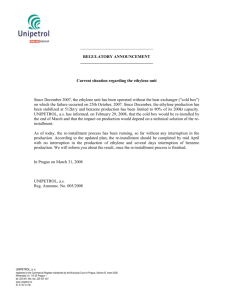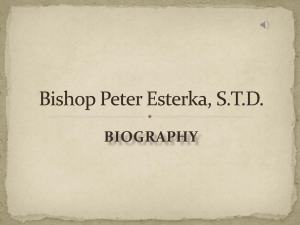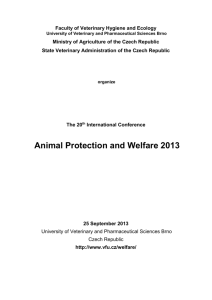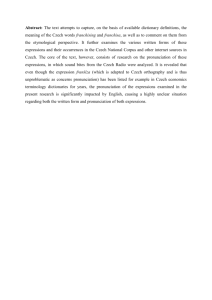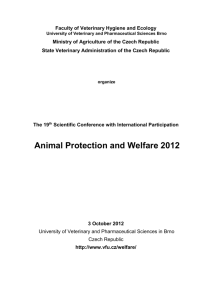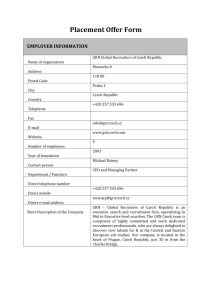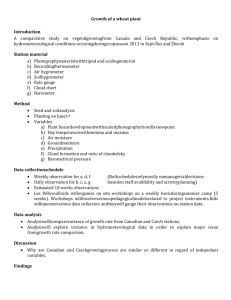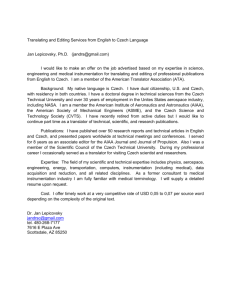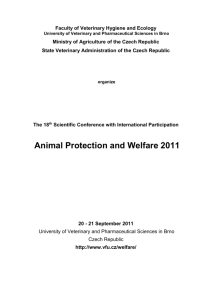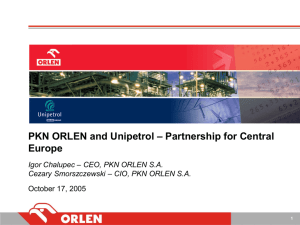prumyslove podniky v ceske republice
advertisement
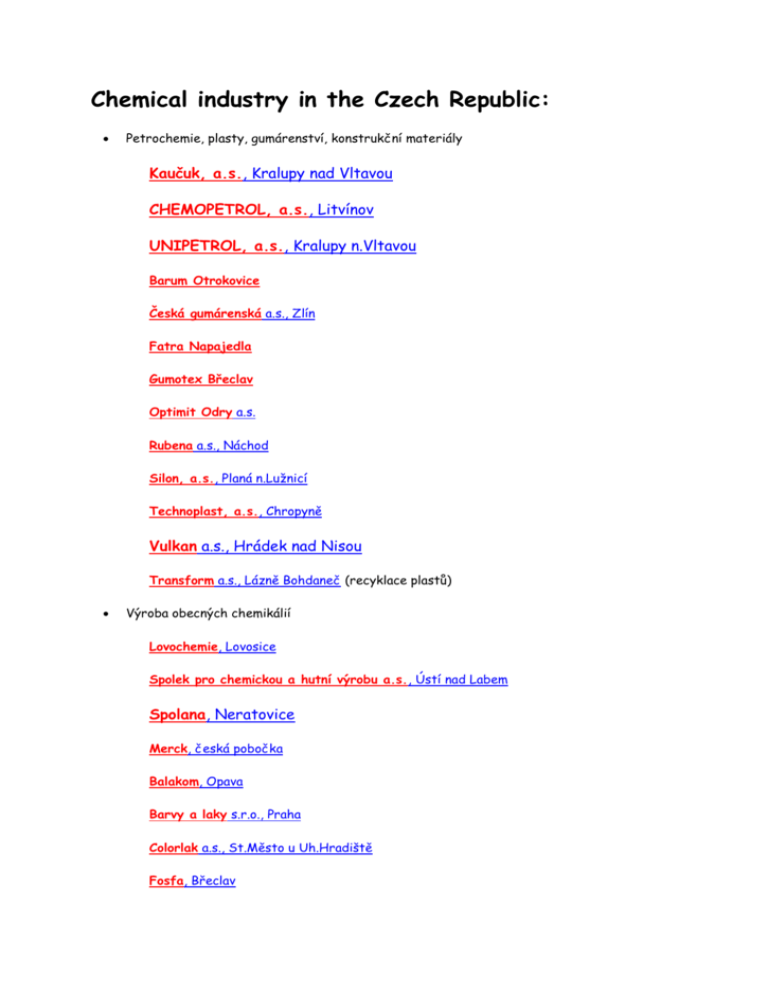
Chemical industry in the Czech Republic: Petrochemie, plasty, gumárenství, konstrukční materiály Kaučuk, a.s., Kralupy nad Vltavou CHEMOPETROL, a.s., Litvínov UNIPETROL, a.s., Kralupy n.Vltavou Barum Otrokovice Česká gumárenská a.s., Zlín Fatra Napajedla Gumotex Břeclav Optimit Odry a.s. Rubena a.s., Náchod Silon, a.s., Planá n.Lužnicí Technoplast, a.s., Chropyně Vulkan a.s., Hrádek nad Nisou Transform a.s., Lázně Bohdaneč (recyklace plastů) Výroba obecných chemikálií Lovochemie, Lovosice Spolek pro chemickou a hutní výrobu a.s., Ústí nad Labem Spolana, Neratovice Merck, česká pobočka Balakom, Opava Barvy a laky s.r.o., Praha Colorlak a.s., St.Město u Uh.Hradiště Fosfa, Břeclav DEZA, Valašské Meziřičí AGA, Praha 8 Technické plyny Druchema, Praha družstvo pro chemickou výrobu a služby Ekochem Šorm, Praha Hlubna v.d., Brno Severochema, Liberec družstvo pro chemickou výrobu Pragochema, Praha Kvalifikovaná chemie a farmacie Lachemaa.s., Brno Lachemaa.s., Brno, záv. Neratovice Lachema Brno, záv. Blansko Foma, Hradec Králové Bochemie, Bohumín Crytur, Turnov Draslovka a.s., Kolín Synthesia, Pardubice-Semtín Farmak, Olomouc Profile: Unipetrol is a group of companies operating in the chemical industries sector in the Czech Republic, primarily in crude oil processing,distribution of fuels, petrochemistry and fertiliser production. In all of these fields,Unipetrol is a major representative of the given industrial sector in the Czech Republic and in Central Europe. The Unipetrol Group includes primarily the following: Česká rafinérská (a joint venture with the multinational companies AgipPetroli, Conoco and Shell) and Paramo, the largest Czech producers of motor fuels, bitumens, lubricants and other products related to crude oil processing. Chemopetrol, Kaučuk and Spolana,involved mainly in the production of petrochemical products and plastics. Benzina, the largest network of petrol stations in the Czech Republic. The Group has the following affiliated members: Lovochemie, an important producer of industrial fertilisers and other inorganic chemicals, Aliachem - a group of enterprises involved in organic and inorganic chemistry and the processing of plastics and a number of smaller distribution, service and research companies. History: The Unipetrol was founded in 1994 to bring together a selection of Czech petrochemical companies to a grouping which would be able to compete with strong multinational concerns. The majority stakeholder of the company is the Czech state, represented by the National Property Fund. The annual turnover of firms from the Unipetrol Holding is over then 60bn, which makes the group one of the largest companies in the Czech Republic as well as the most prominent exporters. In 2002, revenue from exports reached almost 37%. Products: Spolana, Neratovice Spolana aims at production of chlorine especially for PVC and a lots of another chemicals which need chlorine for their existence (for example sodium chloride, HCl) also liguid chlorine, 5 kinds of suspenzive PVC. Spolana is a big producer of sulfuric acid or caprolactam, too. Paramo Paramo is the renowned manufacturer of fuels, automotive oils, machining, technological and preservation agents, plastic lubricants, asphalt insulation products and road asphalts. Kaučuk Styrene-butadiene rubbers are produced under the name KRALEX. They are mainly used in the rubber industry and boot and shoe industry and for the production of small household accessories and sportswear. Liquid polybutadienes are produced under the name KRASOL; they are widely used for example as a binder for granulates that are used for the production of sports stadium and hall surfaces. In the building industry, the product found many applications. KRASTEN is the trademark for standard high-impact polystyrene. KRASTEN found its application primarily in the electrical engineering industry, consumer goods and food industry. The expandable KOPLEN polystyrene has found its application primarily in the production of shaped pieces, foils, blocks, and insulation boards, and generally in the construction industry. FORSAN is the trademark for acrylonitrile-butadiene-styrene polymer (ABS), which is used for the production of interiors and exteriors in the car industry. Furthermore, FORSAN can be used in the consumer goods and electrical engineering industry. Chemopetrol Ethylene – for production of PE,spirits,…in grocery to ripen fruits Propylene – for PP and oxoalcohols… PE – toys, bottles, folios,… PP – dishes, pokos, toys, folios, textiles (bags), … Synthetic spirit Ammonia Benzene Profile: IVAX Pharmaceuticals s.r.o. (previously also known under the business firms IVAX – CR a.s., Galena a.s., Galena s.p.) is a leading Czech pharmaceutical company which works with the one hundred and twenty years long tradition of pharmaceutical manufacturing in the region of the Opava city. It has a large portfolio of products. The company doesn´t offer only human and veterinary medicinal products but also substances and herbal extracts. History: This company has really a rich history. Everything started in 1869, when Gustav Hell, the later founder of the factory, moved to Opava city. In 1883 the company was registrated in Bussines register as “Gustav Hell und Company”. In 1885 the company bought the facilities of today´s company from company “Glassner and company” and the real history of Galena started. The factory was in huge development until WW1. then it had to cooperate with an Austria company, which ensured expedition to Austria. After WW2 the company had to start from beginning. The new start was in 1946. In 1952 the concern was reorganized and got the name : Galena. The complementary program for many years was production of Kofo –syrup as a basic material to product Kofola. The American IVAX Corporation with the seat in Miami, Florida, became the majority owner of the company within the framework of privatization. In 2001 Galena was renamed to Ivax. Products: Main orientation of the research work: development of medicinal products and food supplements, development of active pharmaceutical ingredients obtained by means of isolation from herbal materials as well as by means of semi-synthetic modifications of natural substances and by means of totally synthetic processes, Development of biotechnological processes. Antiseptics, disinfectants Septonex®, cutaneous spray, solution A lot of vitamins, cosmetics,… Profile: Research, development and production of antineoplastic agents and cardio-vascular drugs, antivirotics for herpes virus infections, diagnostics and specialty chemicals. History: The Lachema Brno started to manufacture, finish and pack pure, laboratory and specialty chemicals more than a half century ago. During 1950s Lachema became a major manufacturer of analytical reagents and indicators, dyes for microscopy, sugars, amino acids and a range of other chemicals and bio-chemicals. 1964 – was established The Institute of Pure Chemicals, which connected to several institutes, known as Lachema 1999 – a new strong strategic partner – Pliva, multinational pharmaceuticals company, became a majority stockholder 2000 – the name of company was changed into Pliva – Lachema Pliva – Lachema aimed its strategy on generic preparations, especially cytostatics, support therapy, qualified chemistry and selected diagnostics. Products: Pharmaceuticals The research, development, production and sale of top quality medical products used in the treatment of serious diseases such as - antineoplastic agents and cardiovascular drugs, and antivirotics for the treatment of herpes virus infections Diagnostics Research, development, production and sale of diagnostic preparations for biochemical and microbiological laboratories, for fast diagnostics at the surgery and for self-monitoring. Chemicals: The research, development, production and sale of active substances and their intermediates, speciality chemicals based on adamantane and its derivatives Synthesia: - Synthesia is a part of Aliachem, belonging to Unipetrol group, focused on the production of cellulose derivates, pigments and dyes, and also advanced organic intermediates. It´s one of the world´s largest nitrocellulose producers. Its customers are producers of colours, paper and textile industry, agriculture industry, pharmaceuticals concerns, etc. Vulkán Profile: VULKAN is among the leading European producers of latex goods. Its production programme is made up of four fundamental elements, which mainly comprise the production of condoms, examinational and surgical gloves, children’s pacifiers, and household rubber gloves. History: 1890 – The foundation of the Bohemian – Saxon factory for rubber products in Hrádek nad Nisou 1938 – the factory was bought by Fridjof Peterson from Sweden 1942 – A new owner was a.s. Hans Scheibert , and the company got name Gummiwerke Grottau, and it worked on wartime production of rubber belts, sealing for submarines and aeroplanes, etc 1950 – Vulkan 1969 – 1989 - The company became the monopoly producer in the field of condoms, children’s pacifiers and proboscis, balloons and toys, surgical, household and technical gloves for the whole of Eastern Europe The history of the condom: The first mention of a mechanical device that covered and adorned the male genitals dates back to the year 1350 B.C. and comes from Ancient Egypt. The device mentioned, which resembles today’s condom, was also used in Asian cultures. We cannot, however, speculate on a specific era for Asian use. The first users in these lands were most probable the Celts. The first evidence of actual condoms comes from 1564 A.D., when Italian doctor Pallopius created a kind of sheath that was made of flax. This textile material was replaced with animal, and particularly sheep gut during the 17th century. It was at this time that the name “condom” was born. Certain researchers say that the name originated thanks to an English doctor called Conton (some sources specify the name Condom). This gentleman was the court doctor of the English King Charles II. (1630-1685). Doctor Conton apparently handed out modified sheep gut to members of the royal family and their entourage in order to protect them against sexual diseases and the bearing of children out of wedlock. Indeed the doctor was rewarded for his sterling work in caring for the welfare of the throne with an elevation to the ranks of the nobility. The French town of CONDOM also proudly claims credit for the naming of the condom. However, this small town is affected by one major problem in that the sign bearing the name of the town is always being lost to tourists and constantly in need of replacement. The thieving souvenir hunters cannot even be discouraged by police patrols or taxpayers.
